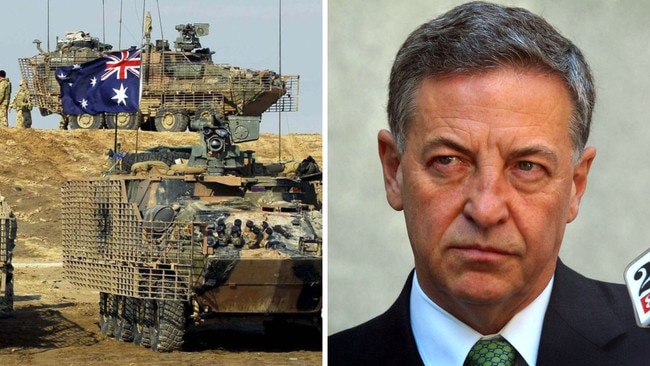2004 Cabinet Papers: Former defence minister Robert Hill thought Iraq could be a pluralist free-market state
Staying the course in Iraq was seen as showing commitment to the US alliance, with the potential for the country to become a ‘model’ for the region, former defence minister Robert Hill wrote to John Howard.

Defence minister Robert Hill saw the potential for Iraq, following the US-led invasion in March 2003, becoming a “modern” state that was “a model” for other countries in the Middle East with a free-market economy and pluralist society, which would be in Australia’s interests.
A letter to John Howard presented to the National Security Committee, released by the National Archives of Australia, reveals Mr Hill saw Australia’s military presence in Iraq as “a demonstrable example” of commitment to the US alliance and shaping “the strategic environment” of the Middle East.
“It would be in Australia’s interests for Iraq to develop politically and economically and become a model for broader political reform in the Middle East,” Mr Hill wrote to Mr Howard in February 2004. “Political reform in the Middle East would, in turn, help the long-term reduction of extremism, and its offshoot, Islamic-based terrorism.”
“Economically, it is in Australia’s interests that the developing world’s energy supplies continue to flow without manipulation by local regimes for political purposes. A pluralist Iraq which promotes the free market as the dominant form of economic organisation within the Middle East, and which served as a model of stability through political reform, would be very much in Australia’s interests.”
John Howard told The Australian the US administration of George W. Bush was “talking a lot about Iraq becoming a bit of a model” for the Middle East and it looked like Mr Hill had also “drunk a bit of the Kool-Aid”.
No weapons of mass destruction were ever found in Iraq – the purpose of the mission – and transitional governments were destabilised by an insurgency against occupying coalition forces. Through 2004, foreign minister Alexander Downer warned of growing violence by insurgents and Australian nationals being targeted.
“What happened in 2003 complicated our mission and the public justification for it,” Mr Howard said. “It became clear after some months that there were no stockpiles of WMD although there were plenty of programs, there was plenty of evidence of the wherewithal.
“So was there a mission change once we were there? There was no deliberate change of mission but we were pragmatists. Having made a very bold and quite controversial policy decision to go in there, we weren’t in the business of giving up and saying it has all been a mistake.”
Mr Howard thought dissolving the Iraqi army and disbanding Ba’ath-run civic entities was “a big mistake” and reduced capacity “to handle the insurgency”, which plagued Iraq during 2004.
Former treasurer Peter Costello, a member of the NSC, reflected that Iraq had little chance of evolving into a pluralist free-market state that would be a model for other countries.
“The lesson that we should learn is you can’t build democracy from the outside in these places,” he told The Australian. “Democracy has to come out of the will and the experience of the people. There was mission change, and if the mission became to build democracy in Iraq and a free-market society, it failed.”
Trade minister Mark Vaile advised cabinet in August 2004 of the intense competition to secure wheat contracts with Iraq and inquiries into the Oil-for-Food Program prompting criticism of the Australian Wheat Board’s dealings with Saddam Hussein’s administration. The corruption by the AWB would not be reported until the following year.
Cabinet records also document the Howard government’s response to a review of intelligence regarding WMD; the legal status of the ongoing presence of coalition forces in Iraq, and the role in “capacity-building strategies”; while reports of prisoner abuse at Abu Ghraib prison was noted by ministers.




To join the conversation, please log in. Don't have an account? Register
Join the conversation, you are commenting as Logout